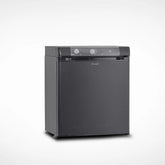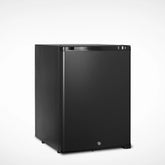RV Refrigerators Explained: A Complete Guide for Campers
When embarking on an RV adventure, having a reliable and efficient refrigerator is essential. Whether you're heading out for a weekend getaway or a long-term road trip, keeping food fresh and drinks cold adds a layer of comfort to your journey. However, selecting the right RV refrigerator can be daunting due to the range of options available. In this guide, we’ll explore the different types of RV refrigerators, their pros and cons, and how to choose the best one for your needs.
1. Introduction: The Importance of Refrigeration in RV Life
In RV life, refrigeration is critical for maintaining food safety, reducing the need for frequent grocery stops, and ensuring the comfort of a cold drink after a long day on the road. Unlike a typical home fridge, RV refrigerators must contend with limited power sources, fluctuating temperatures, and space constraints, making the right choice all the more important.
Whether you're connected to shore power at an RV park or boondocking in the wilderness, having the right refrigerator helps you store perishable goods and prepare meals with ease. In this article, we’ll break down everything you need to know to make an informed decision about your RV refrigerator.
2. Three Main Types of RV Refrigerators
RV refrigerators come in three main types: absorption refrigerators, compressor refrigerators, and thermoelectric refrigerators. Each type operates differently, with unique advantages and drawbacks depending on your travel style and energy resources.
Absorption Refrigerators
Absorption refrigerators use heat from propane or electric sources (AC or DC) to initiate a cooling process involving ammonia and hydrogen gas. These units are favored for off-grid camping since they can run on propane.
·Advantages: Absorption refrigerators are versatile in their energy sources, making them ideal for off-grid camping where electricity is scarce. They can operate on propane, 120V electricity, or 12V DC power.
·Disadvantages: They tend to cool more slowly than other types and are less efficient in high-temperature environments. Absorption refrigerators also need to be level to operate effectively, as tilting can affect the ammonia-based cooling process.
Compressor Refrigerators
Compressor refrigerators work similarly to household refrigerators. They use a compressor and refrigerant to cool the interior and are powered by electricity.
·Advantages: Compressor refrigerators are highly efficient, especially in hot climates. They cool quickly and can maintain low temperatures regardless of ambient conditions. Many models can run on both 120V AC and 12V DC power, making them ideal for both RV parks and off-grid adventures (with solar power options).
·Disadvantages: These refrigerators rely solely on electricity, which can be a disadvantage for those who spend most of their time boondocking or traveling off-grid without reliable access to power.
Thermoelectric Refrigerators
Thermoelectric refrigerators are less common but can be useful for short trips. These models use the Peltier effect, where electrical current flows between two different types of materials to create cooling.
·Advantages: Thermoelectric refrigerators are lightweight and portable. They’re typically compact and quiet, making them a good option for those who only need temporary cooling for short trips.
·Disadvantages: They have limited cooling capacity, often only cooling to 20-30 degrees below ambient temperature. This makes them unsuitable for extended trips or storing perishable goods.
3. Pros and Cons of Different RV Refrigerators
Choosing the right RV refrigerator comes down to weighing the pros and cons of each type based on your travel habits, power availability, and space constraints.
Absorption Refrigerators
·Pros:
·Multi-energy source (propane, electricity)
·Suitable for off-grid camping
·No moving parts, making them relatively quiet
·Cons:
·Slower cooling times
·Inefficient in high temperatures
·Must be kept level to operate properly
Compressor Refrigerators
·Pros:
·Fast, efficient cooling
·Works well in hot climates
·Can run on both AC and DC power, compatible with solar setups
·Cons:
·Relies solely on electricity
·Can deplete RV batteries if not properly managed
Thermoelectric Refrigerators
·Pros:
·Lightweight and portable
·Quiet operation
·Ideal for short trips or occasional use
·Cons:
·Limited cooling capacity
·Not suitable for extended off-grid use or storing perishables
4. How to Choose the Right RV Refrigerator
Now that we’ve explored the different types of RV refrigerators, let’s look at the factors to consider when choosing the best model for your needs.
Energy Source
Your energy setup will largely determine the type of refrigerator that suits you best. If you frequently camp off-grid, a propane-powered absorption refrigerator is a strong option. However, if you have access to solar panels or camp primarily at RV parks with hookups, a compressor refrigerator may be the better choice due to its efficiency.
Capacity
Consider the size of your RV and how much space you can dedicate to a refrigerator. Larger RVs can accommodate full-size models, while smaller camper vans may require compact or portable units. Think about how many people you’ll be feeding and the length of your trips—this will guide you to the appropriate capacity.
Energy Efficiency and Battery Protection
Energy efficiency is key for off-grid campers who rely on solar power or batteries. Look for refrigerators with low energy consumption, as well as those that offer battery protection features, such as automatic shutoff when the battery level is low. This can prevent your refrigerator from draining your RV’s battery, leaving you without power.
5. Maintenance and Care for RV Refrigerators
Proper maintenance is essential to ensure your RV refrigerator performs at its best and lasts for years to come. Here are a few key maintenance tips:
Regular Cleaning
Regularly clean the inside and outside of your refrigerator to prevent dust buildup, which can affect its performance. Pay special attention to vents and coils, especially on compressor refrigerators, as they need proper airflow to function efficiently.
Check Seals
Ensure that the door seals are intact and functioning properly. A weak or damaged seal can cause cold air to escape, forcing the refrigerator to work harder and use more energy.
Temperature Monitoring and Settings
Check the temperature settings and ensure the fridge is maintaining a safe temperature for food storage. For most refrigerators, the ideal temperature is between 35°F and 38°F (1.7°C to 3.3°C).
Routine Inspections
For gas absorption refrigerators, routine checks by a professional are recommended, especially if you frequently use propane as a fuel source. These refrigerators can develop issues with the cooling system if not regularly maintained.
6. User Experience and Real Feedback: SMAD Gas Refrigerators
SMAD gas refrigerators have become increasingly popular among RV enthusiasts, known for their versatility, energy efficiency, and reliability. Let’s take a closer look at some of the features that make SMAD refrigerators a go-to choice for campers.
SMAD 12V Compressor Refrigerators
SMAD’s 12V compressor refrigerators are a favorite among off-grid travelers. These models feature rapid cooling and excellent energy efficiency, allowing users to keep their food cool without draining their RV batteries. SMAD refrigerators are also known for their quiet operation, making them perfect for overnight trips when peace and quiet are essential.

SMAD Gas Absorption Refrigerators
For those who prefer multi-energy source models, SMAD’s gas absorption refrigerators offer the flexibility to switch between propane and electricity. These refrigerators provide reliable cooling even in remote locations where electricity isn’t readily available. Users appreciate the three-level battery protection system, which prevents the RV’s battery from being depleted during long off-grid trips.
Campers frequently mention the durability of SMAD refrigerators, noting that they hold up well under the rough conditions of RV travel, including uneven terrain and fluctuating temperatures. The compact design of their absorption models also makes them a perfect fit for smaller RVs or camper vans with limited space.

7. Conclusion: Best Practices for Choosing an RV Refrigerator
When selecting an RV refrigerator, consider your energy setup, space constraints, and cooling needs. Absorption refrigerators offer flexibility for off-grid camping, while compressor models provide fast, efficient cooling. Thermoelectric refrigerators, though limited in power, are a lightweight option for shorter trips.
For those looking for a trusted brand, SMAD refrigerators offer versatile, energy-efficient options that cater to both off-grid adventurers and those staying at RV parks. With proper maintenance and careful consideration of your needs, you’ll be able to choose the perfect refrigerator for your RV lifestyle.



